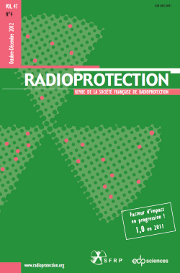Article contents
Amelioration of soils contaminated with radionuclides: Exploiting biodiversity to minimise or maximise soil to plant transfer
Published online by Cambridge University Press: 17 June 2005
Abstract
There is much current interest in managing and manipulating radionuclide transfer from soils to plants, either for `safe' crops or for phytoextraction of radionuclide contaminated soils. Potentially there is biodiversity in plant uptake that might aid these efforts. We have established the effects of phylogeny (evolutionary history) on the uptake of numerous heavy metal and nutrient elements. Here, using the same Residual Maximum Likelihood techniques, we report phylogenetic effects on radionuclide uptake by plants derived from databases of several hundred species of plants we have collated over recent years. There are differences of at least two orders of magnitude in the concentration to which plants take up isotopes of Cs, Sr, Cl, Ru, S, and I. When analysed using hierarchical Analysis of Variance coded using a recent molecular phylogeny of flowering plants it is clear that for no radionuclide is all the variation inter-specific. Rather, for all radionuclides some of the inter-taxa variation is associated with higher taxonomic levels. In general, therefore, groups of plants with high and low uptake of radionuclides, and that might be useful for managing or manipulating radionuclide uptake, can be delineated. Here we discuss some of these groups and how they might be useful.
- Type
- Research Article
- Information
- Copyright
- © EDP Sciences, 2005
- 2
- Cited by


